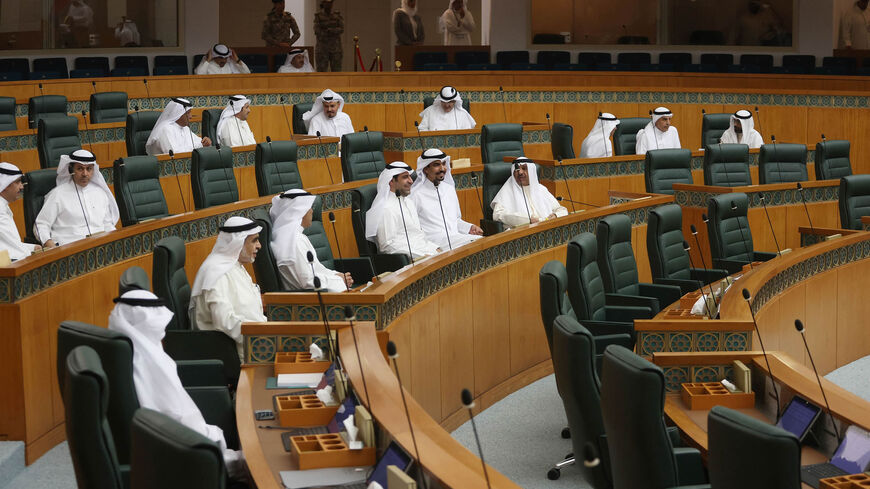DUBAI — Kuwait announced its new government last Sunday, its seventh in three years, in the latest shakeup driven by political and fiscal paralysis that is expected to reach new heights if not resolved.
Experts see the dance of government and parliament reshuffles — which have been ongoing since 1960 according to Al Jazeera — as hindering the execution of investment and reforms in national infrastructure, health and social services, and also economic projects.
Kristin Smith Diwan, a senior resident scholar at The Arab Gulf States Institute in Washington, said the culmination of political inefficiencies have added up, and exacerbated the situation in recent years.
“In the last decade or so Kuwait has turned more inward due to this repeated kind of political crisis,” Diwan told Al-Monitor.
“What it means for residents is an aging and deteriorating public infrastructure that is having a social impact,” she said, as revenue for public spending comes from the top and is provided directly through government employment, subsidies and public services.
Kuwait’s more than 4.25 million population is growing but the government funded infrastructure is unable to keep up.
“This means that you have those who can afford it moving towards more private deliverances of these goods and services,” said Diwan.
Kuwait is still a wealthy country. It has the strongest currency in the world, with 1 Kuwaiti dinar buying $3.26, according to Forbes, and has one of the strongest sovereign wealth funds globally.
Despite being a rich country, with 7% of the world’s crude reserves, said Diwan, the broader population is feeling a lot poorer despite having a reported zero percent poverty level.
This is also translating into a strangling hold on the greater economy that is looking to develop and diversify the country’s revenue.
Kuwait’s cabinet submitted a draft 2023-2024 budget that estimated a deficit of more than $16 billion dollars for the year starting in April, according to the Economic Times.
Sean Yom, associate professor of political science at Temple University, said the hardest hitting result of this political paralysis is on Kuwait’s future, where oil accounts for nearly half of the country’s gross domestic product and 95% of its export revenue, according to the International Trade Administration.
“There’s no balanced idea or project for oil beyond simply selling it,” Yom told Al-Monitor, which makes it one of the only Gulf Cooperation Council (GCC) countries that isn’t able to efficiently implement its economic diversification vision that the region is known for.
Part of these strategies enacted by countries such as the United Arab Emirates (UAE) and Saudi Arabia include the beginnings of pathways to citizenship for their expatriate populations that make up more than half of the labor force for many Gulf countries.
Kuwait doesn’t have such a path for its more than 70% expatriate population, explained Yom, and instead is blaming them for its monetary woes.
“There have been a growing number of people in parliament who see the expatriate labor force as a scapegoat for Kuwait's economic problems, claiming they are using up the country’s social and financial services. This is completely the opposite of reality — expats make the economy work,” he told Al-Monitor. Yet many policies are working against expatriates in the country.
Kuwait has seen a recent uptick in actions against expatriate populations, with 23,000 deportations taking place in the first 10 months of 2022, according to the Kuwaiti newspaper Al-Qabas. Then in late March of this year, the Ministry of Interior announced the arrest of around 10,000 masseurs, fishermen and farmers for violating residency labor laws, according to the Kuwait Times. At the same time, it formed a committee to withdraw driving licenses from expatriates who earn less than 600 dinar, or about $2,000, per month and do not have a university degree, reported Kuwait daily paper Al-Jarida.
The culmination of such policies, and a lack of impactful ones, are only growing, said Yom.
“For more than a year now, no meaningful laws have passed, including no budget laws, no debt laws, no large scale economic projects,” he said, adding that there has not been a productive parliamentary session of lawmaking since COVID-19.
“Kuwaitis want a system where parliament just cooperates with the government and the government cooperates with parliament,” he argued, describing the shared and popular sentiment of Kuwaiti people that want their country’s economy to keep up with those of its fast developing Gulf neighbors.


.jpg?h=484aaada&itok=l9O0K7bm)





